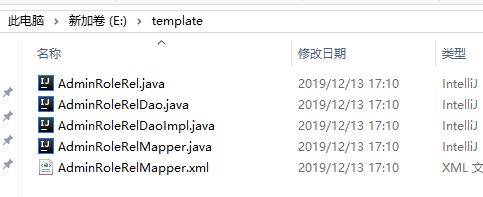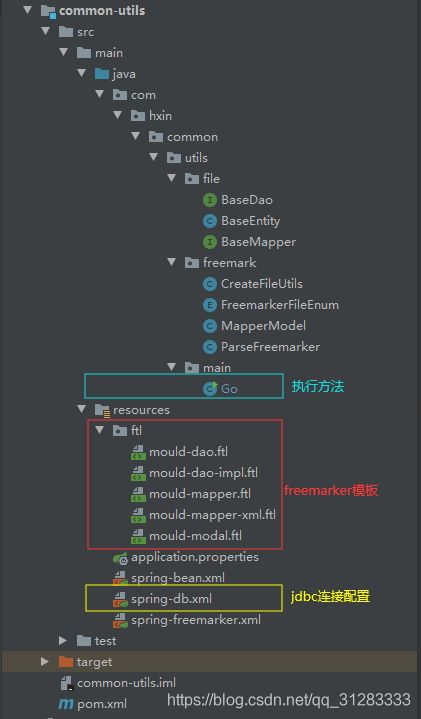Java简单实用的JDBC模板生成
源码github地址:https://github.com/hxinZhang/hxin.git(common-utils项目)
本文用mybatis为持久化层,使用freemarker模板引擎来生成entity、xml、mapper、dao等,接下来就让我们来看看如何使用。
第一步、配置JDBC
打开spring-db.xml,配置数据库的地址以及用户名、密码等。
<?xml version="1.0" encoding="UTF-8"?>
<beans xmlns="http://www.springframework.org/schema/beans"
xmlns:xsi="http://www.w3.org/2001/XMLSchema-instance"
xmlns:tx="http://www.springframework.org/schema/tx"
xmlns:aop="http://www.springframework.org/schema/aop"
xmlns:context="http://www.springframework.org/schema/context"
xsi:schemaLocation="
http://www.springframework.org/schema/beans
http://www.springframework.org/schema/beans/spring-beans-4.0.xsd
http://www.springframework.org/schema/tx
http://www.springframework.org/schema/tx/spring-tx-4.0.xsd
http://www.springframework.org/schema/aop
http://www.springframework.org/schema/aop/spring-aop-4.0.xsd
http://www.springframework.org/schema/context
http://www.springframework.org/schema/context/spring-context.xsd">
<!-- 配置数据源 使用的是Druid数据源 -->
<bean name="dataSource" class="com.alibaba.druid.pool.DruidDataSource"
init-method="init" destroy-method="close">
<property name="url" value="jdbc:mysql://127.0.0.1:3306/steps_interest?useUnicode=true" />
<property name="username" value="root" />
<property name="password" value="123456" />
<!-- 初始化连接大小 -->
<property name="initialSize" value="5" />
<!-- 连接池最大使用连接数量 -->
<property name="maxActive" value="500" />
<!-- 连接池最小空闲 -->
<property name="minIdle" value="5" />
<!-- 获取连接最大等待时间 -->
<property name="maxWait" value="60000" />
<property name="poolPreparedStatements" value="true" />
<property name="maxPoolPreparedStatementPerConnectionSize"
value="33" />
<!-- 用来检测有效sql -->
<property name="validationQuery" value="SELECT 1" />
<property name="testOnBorrow" value="false" />
<property name="testOnReturn" value="false" />
<property name="testWhileIdle" value="true" />
<!-- 配置间隔多久才进行一次检测,检测需要关闭的空闲连接,单位是毫秒 -->
<property name="timeBetweenEvictionRunsMillis" value="60000" />
<!-- 配置一个连接在池中最小生存的时间,单位是毫秒 -->
<property name="minEvictableIdleTimeMillis" value="25200000" />
<!-- 打开removeAbandoned功能 -->
<property name="removeAbandoned" value="true" />
<!-- 1800秒,也就是30分钟 -->
<property name="removeAbandonedTimeout" value="1800" />
<!-- 关闭abanded连接时输出错误日志 -->
<property name="logAbandoned" value="true" />
<!-- 监控数据库 -->
<property name="filters" value="mergeStat" />
</bean>
</beans>
第二步、配置Go类,从上到下依次有库名、表名、存放的路径(windows的路径)、entity包路径、dao包路径、mapper包路径。
package com.hxin.common.utils.main;
import com.hxin.common.utils.freemark.CreateFileUtils;
/**
* 生成工具
* @author hxin
*/
public class Go {
//库名
private static final String DATABASENAME = "steps_interest";
//表名
private static final String TABLENAME = "admin_role_rel";
//生成文件存放路径
private static final String PATH = "E:\\template\\";
//entity 路径
private static final String ENTITYPATH = "com.steps.interest.background.entity.admin";
//dao 路径
private static final String DAOPATH = "com.steps.interest.background.dao.admin";
//mapper 路径
private static final String MAPPERPATH = "com.steps.interest.background.mapper.admin";
public static void main(String[] args) {
CreateFileUtils.run(PATH, ENTITYPATH, MAPPERPATH, TABLENAME, DATABASENAME, DAOPATH);
}
}
第三步、右键运行则能看到生成的结果如下

是不是很简单~
接下来我们来看下怎么实现的
首先看下项目的目录

打开CreateFileUtils.java的setColumnInf()方法,可以看到是通过jdbc的原生查询来实现的。
/**
* 获取列信息
* @return
*/
private static void setColumnInfo() {
Connection connection = null;
PreparedStatement ps1 = null;
ResultSet rs1 = null;
String sql1 = null;
PreparedStatement ps2 = null;
ResultSet rs2 = null;
String sql2 = null;
try {
//实体类 属性信息 key 属性名称 value 属性类型
Map<String, String> fieldMap = new HashMap<String, String>();
//属性与字段名 映射关系 key 属性名称 value 字段名称
Map<String, String> filedColumnMap = new HashMap<String, String>();
//注释与字段名 映射关系 key 注释 value 字段名称
Map<String, String> remarkColumnMap = new HashMap<String, String>();
//过滤map
Map<String, String> tempColumnMap = new HashMap<String, String>();
DruidDataSource druidDataSource = (DruidDataSource) context.getBean("dataSource");
connection = druidDataSource.getConnection();
sql1 = "select * from :tableName limit 1".replace(":tableName", model.getTableName());
ps1 = connection.prepareStatement(sql1);
rs1 = ps1.executeQuery();
ResultSetMetaData rsmd = rs1.getMetaData();
for (int i = 1; i <= rsmd.getColumnCount(); i++) {
String columnName = rsmd.getColumnName(i);
filedColumnMap.put(hump(columnName), columnName);
tempColumnMap.put(columnName, hump(columnName));
int columnType = rsmd.getColumnType(i);
//整数
if (columnType == Types.NUMERIC || columnType == Types.INTEGER) {
fieldMap.put(hump(columnName), "Integer");
} else if (columnType == Types.BIGINT) {
fieldMap.put(hump(columnName), "Long");
} else if (columnType == Types.DECIMAL) {
fieldMap.put(hump(columnName), "BigDecimal");
} else if (columnType == Types.VARCHAR ||
columnType == Types.CHAR) {//字符串
fieldMap.put(hump(columnName), "String");
} else if (columnType == Types.DATE ||//日期
columnType == Types.TIME) {
fieldMap.put(hump(columnName), "Date");
} else if (columnType == Types.TIMESTAMP) {
fieldMap.put(hump(columnName), "Date");
} else if (columnType == Types.DOUBLE) {
fieldMap.put(hump(columnName), "Double");
} else {//其它
fieldMap.put(hump(columnName), "String");
}
}
model.setFieldMap(fieldMap);
model.setFiledColumnMap(filedColumnMap);
//用于查询注释
sql2 = "select `COLUMN_NAME`,`column_comment`,`column_type`,`column_key` from information_schema.columns where table_schema = ':databaseName' and table_name = ':tableName'".
replace(":databaseName", model.getDatabaseName()).replace(":tableName", model.getTableName());
ps2 = connection.prepareStatement(sql2);
rs2 = ps2.executeQuery();
while(rs2.next()){
String columnName = rs2.getString("COLUMN_NAME");
String columnComment = rs2.getString("column_comment");
remarkColumnMap.put(tempColumnMap.get(columnName), columnComment);
}
model.setRemarkColumnMap(remarkColumnMap);
} catch (SQLException e) {
e.printStackTrace();
} finally {
try {
rs1.close();
ps1.close();
connection.close();
} catch (SQLException e) {
e.printStackTrace();
}
}
}
接着使用freemarker解析器,把数据写入到模板,下面是entity的freemarker模板
package ${modelPath};
import lombok.Data;
import lombok.ToString;
import java.io.Serializable;
import java.util.Date;
/**
* ${modelName}
* @author
*/
@Data
@ToString
public class ${modelName} extends BaseEntity<${modelName}> implements Serializable{
<#if fieldMap??>
<#list fieldMap?keys as key>
//${remarkColumnMap[key]}
private ${fieldMap[key]} ${key};
</#list>
</#if>
}
下面是freemarker解析器
package com.hxin.common.utils.freemark;
import freemarker.template.Template;
import org.springframework.beans.factory.annotation.Autowired;
import org.springframework.stereotype.Component;
import org.springframework.ui.freemarker.FreeMarkerTemplateUtils;
import org.springframework.web.servlet.view.freemarker.FreeMarkerConfigurer;
/**
* freemarker 解析器
* @author hxin
*/
@Component
public class ParseFreemarker {
@Autowired
private FreeMarkerConfigurer freeMarkerConfigurer;
public String parseFtlFile(String path, Object data) {
String htmlText = null;
try {
Template tpl = freeMarkerConfigurer.getConfiguration().getTemplate(path);
htmlText = FreeMarkerTemplateUtils.processTemplateIntoString(tpl, data);
} catch (Exception e) {
e.printStackTrace();
}
return htmlText;
}
}
最后是使用io流写到文件里
//===================================创建字符流 ====================================
//获取IO流
private static PrintWriter getWriter(String fileName) {
OutputStream out = null;
BufferedOutputStream bos = null;
OutputStreamWriter w = null;
PrintWriter pw = null;
try {
File file = new File(model.getPath() + File.separator + fileName);
if (file.exists()) {
file.delete();
}
out = new FileOutputStream(file, true);
bos = new BufferedOutputStream(out);
w = new OutputStreamWriter(bos, "UTF-8");
pw = new PrintWriter(w);
return pw;
} catch (FileNotFoundException e) {
e.printStackTrace();
return null;
} catch (Exception e) {
e.printStackTrace();
return null;
}
}
欢迎补充~
【原创】未经许可,禁止转载
详细请看文章开头的github地址